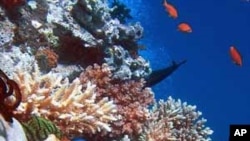A new report blames sunscreen for harming coral reefs.
Corals are animals that live in the oceans and seas. Sometimes they are called the rainforests of the sea. They create some of the most diverse ecosystems on the planet.
Their great spread of colorful rock-like structures form exoskeletons in the water. They are home to tiny marine, or sea, creatures. Now they are being destroyed by pollution, warming seas, overfishing and sunscreen.
John Fauth is a biology professor at the University of Central Florida. He is also a diver. He says the harmful chemical in sunscreen is something called oxybenzone. It blocks the sun’s ultraviolet light—the substance that causes sunburn.
“If you were wearing a bathing suit, say, and covering most of your body with sunscreen, then you jump into the water, the arc that you are contaminating is about the size of an Olympic-size swimming pool.”
Fauth and his fellow researchers ran some toxicology studies. They looked at how oxybenzone effects the coral. He says it does three things: It causes their exoskeletons to turn white, and it damages the adult coral’s DNA, or genetic structure. The genetic damage also hurts the coral at the larvae stage, when it is very young.
The journal Archives of Environmental Contamination and Toxicology published the study in October. Scientists studied coral reefs in the U.S. Virgin Islands in the Caribbean. They also studied reefs in Hawaii.
Fauth says if you look at the water’s surface when people come out of the sea, you can see the sunscreen that has washed off of them.
“Once all these visitors come out of the water, you’ll see a sheen on the water from the sunscreens that they leave behind, because they are slathering up with the sunscreen and jumping into the water so it’s washing off. And when you multiply that times several hundreds (of) people in a small, enclosed area, that’s a recipe for trouble.”
Fauth says the coral aren’t the only creatures in the sea affected by oxybenzone.
“It degrades and then all the other marine life that depend on that reef, including the fishes that we eat, they disappear. They don’t have homes anymore. The corals are the homebuilders.”
He says there is a choice between getting sunburned and harming the coral and the marine life around them. The older sunscreens -- the kind that turn your nose white -- appear to be safe around coral reefs.
Fauth recommends covering up with a long sleeved cotton shirt. He says you can also wear a wetsuit.That will help protect the sea creatures and keep the oceans colorful and alive.
I’m Anne Ball
Jessica Berman reported on this story for VOANews.com. Anne Ball adapted this story for Learning English. Kathleen Struck was the editor.
We want to hear from you. Write to us in the Comments section or on our Facebook page.
______________________________________________________________
Words in This Story
alarming – adj. warning of danger
diverse ecosystems – n. (plural) different ecological systems
exoskeletons –n. an external supportive covering of an animal
toxicology studies – n. the study of poisonous chemicals, drugs, etc., and how a person or living thing reacts to them
larvae –n. a very young form of an insect or creature and it looks like a worm
sheen –n. something shiny
slathering –v. using a large amount





